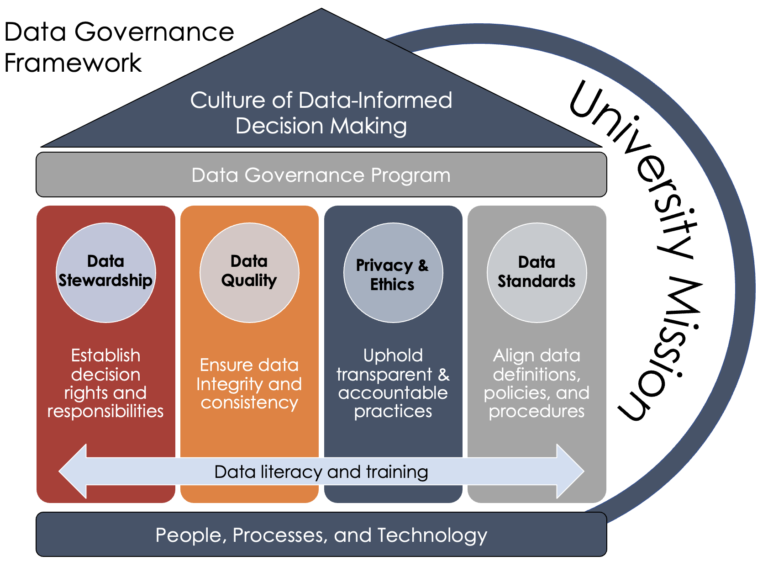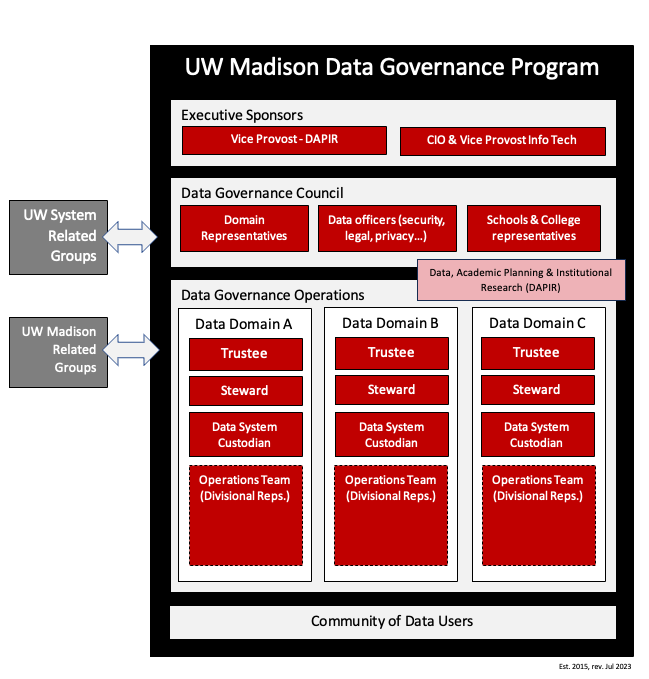Program Mission
Aligning with the priorities established for UW–Madison, the mission of the Data Governance program is to allow for and facilitate campus-wide data-informed decision-making. The program seeks to identify what data exist or need to exist in the future, define what responsibilities exist related to the management of data, and assign accountability for those responsibilities to specific groups or individuals within the university. Read the full Data Governance Program Charter.
Program Pillars
- Data Stewardship: The program determines who has the authority to make decisions regarding access, priorities, and data usage, and under what conditions those decisions can be made.
- Data Quality: Those responsible for data stewardship are accountable for upholding minimum requirements for data quality and data management.
- The program brings campus experts together to evaluate how we institutionally balance.
- Data Standards: The program aligns data practice across the institution by documenting common data definitions and developing campus-wide data policies and procedures.
Data literacy and training: The program promotes data literacy through up-to-date and accessible institutional data documentation and training resources.

Goals and Objectives
- Manage institutional data as a shared university resource for the benefit of the whole university and to support the university’s mission.
- Create structured accountability with defined roles and responsibilities.
- Draft and approve data policies and procedures.
- Facilitate collaboration and education related to data policies and use of data.
- Facilitate standard, consistent data definitions where appropriate.
- Ensure that data policies align with record retention policies.
- Incorporate ethical standards for the use of data, including those outlined in the Association for Institutional Research (AIR) Statement of Ethical Principles and the CARE Principles for Indigenous Data Governance.
Guiding Principles
- Transparency: It should be clear how and when decisions are made and processes are created.
- Consistency: All decisions should be applied consistently.
- Accountability: Progress toward institutional data management goals will be measured and tracked and compliance with policies, procedures, and standards shall be auditable in accordance with current data governance best practices.
- Agility: All processes and requirements will be adaptable to the ever-changing data and technology environment.
- Availability: The appropriate availability and usage of institutional data will be promoted and encouraged in the conduct of university business.
- Change Management: Implementation of new processes and requirements will include a concerted effort in managing change among campus staff.

Data Governance Program Roles
Executive Sponsors
The Executive Sponsors are responsible for program oversight, high-level project approval and prioritization, policy approval, and project funding.
Data Governance Council
The Data Governance Council consists of designated officials who have planning, policy-level, security, legal, and management responsibility for data across the university.
Data Trustees
Data Trustees are the university officials with authority over institutional data or the university’s use thereof.
Data Stewards
Data Stewards are assigned by and accountable to Data Trustees to help define, implement, and enforce data management policies and procedures within their specific domains.
- Note: While formal roles exist, it is everyone’s responsibility to protect the privacy, security, and confidentiality of our data as required.